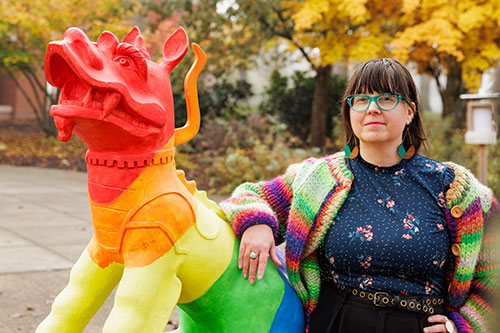 The field of queer criminology is little more than a decade old. Pacific University’s Aimee Wodda sits at the field’s forefront.
The field of queer criminology is little more than a decade old. Pacific University’s Aimee Wodda sits at the field’s forefront.
The assistant professor of criminal justice, law and society, who has focused her research around the intersection of criminology, sexuality and gender, is the 2024-2025 recipient of the Western Society of Criminology’s Richard Tewksbury Award. Named for the former University of Louisville professor considered a trailblazer in the field, the award recognizes significant contributions to scholarship or activism on the intersection of crime and sexuality.
It is a significant honor for Wodda, who earned her PhD in criminology, law, and justice from the University of Illinois at Chicago in 2018 and has emerged as an academic leader in the field.
“I am really interested in gender, sexuality and the law. That’s been my through-line since I was in graduate school,” Wodda said. “I express that in all of the courses I teach. They offer humanistic perspectives on crime and criminality, and course materials challenge students to take a more critical look at the law and how it impacts people.”
Since arriving at Pacific, Wodda has published several peer-reviewed papers with a specific focus on how members of the LGBTQIA+ community are treated by the law. Her book on the intersection of sexuality and criminal punishment, Sex-Positive Criminology (co-authored by Vanessa Panfil), published in 2020, has met with critical acclaim in the criminal justice community.
Wodda is touched to be recognized alongside the likes of significant names in the field such as Tewksbury, Henry Fradella, Angela Dwyer, and specifically Dean Spade, whom Wodda considers a luminary.
“When you say his (Dean Spade’s) name, everyone in our field immediately names their favorite publication. So to see his name on the list of Tewksbury Award winners and then to see my name right beneath is a big deal,” Wodda said. “The scholars on that list are impressive. I’m hoping that my association with those other scholars through the Tewksbury Award will allow me to connect with more people and direct more people to my scholarship.”
Wodda teaches classes at Pacific ranging from green criminology to sex-positive criminology to transformative justice. She sees teaching as a sibling to her educational research, and her students a critical part of her research work. Wodda employs a student-centered teaching approach, where discussions with students inform and shape the purpose of her academic work.
“I give students the materials, create the setting and see what emerges,” she said. “Students ask such great questions and sometimes things go places I would never have imagined.
“I upload materials and then they annotate them. They have such insightful things to say about not just my work, but the other things that we’re discussing. It just provides so much food for thought. I’m already taking notes for the second edition of my book.”
The work is relevant as critical discussions continue about reform in policing and the American criminal justice system in a country where, until 2003, people could still be prosecuted for homosexuality.
Where much of the discussion has centered on race, Wodda believes the time is right to heighten discussion about gender, sexuality, and the law at a moment when women and LGBTQIA+ populations face the potential of continued institutional marginalization.
“There has been a very stigmatizing approach that looked at people as deviants, including LGBTQIA+ populations, and not in a way that was either competent or through the lens of queer theory,” Wodda said. “So what queer criminologists do is look at a few factors. We look at the victimization of queer folks. We look at pathways, asking why do queer people get in trouble with the law? What kinds of crimes are they accused of committing? What are the police responses?”
As she continues to explore the intersection of gender, sexuality, and the law, Wodda hopes that her work, and that of other queer criminologists, can expand the conversation of how the system can be more equitable and better informed about all types of people.